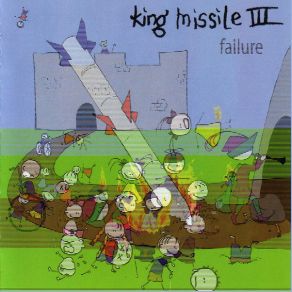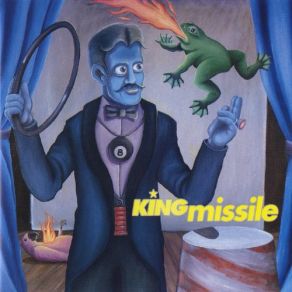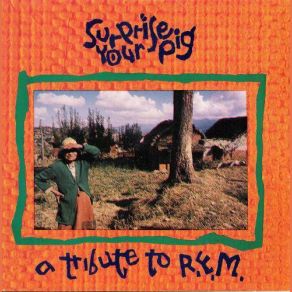King Missile
Wikimp3 information about the music of King Missile. On our website we have 9 albums and 10 collections of artist King Missile. You can find useful information and download songs of this artist. We also know that King Missile represents Rock genres.
Biography
[Edit]Essentially a vehicle for the musings of John S. Hall, King Missile merged off-kilter spoken word monologues with eclectic, mildly psychedelic rock & roll. Hall's dry, absurdist sense of humor colored much of the group's output, blurring the lines between comedy, Beat poetry, narrative prose, and simple rock lyrics. Yet in spite of their focus on Hall's literary bent and all its New York artiness, King Missile was most definitely a band, and relied on music to play a much more than perfunctory role in their overall effect. The band initially won a following on college radio with several albums for producer Kramer's eccentric Shimmy-Disc label, while surviving a major lineup overhaul. Signed to a major-label deal with Atlantic, they scored a highly unlikely novelty hit with 1992's "Detachable Penis," which conquered MTV and college radio despite its subject matter. Their new audience didn't stick, however, and the second lineup split after another album; Hall later organized a third version of King Missile, and continued recording.
New York-based poet John S. Hall founded King Missile in 1986, having given several spoken word performances around Manhattan's Lower East Side. Seeking a more engaging method of presentation, he recruited his friend, guitarist Dogbowl (b. Stephen Tunney) to accompany him. Eventually, the two put together a full band — with the full name King Missile (Dog Fly Religion) — featuring saxophonist Alex Delaszlo and drummer R.B. Korbet, and went into the studio to cut a demo with engineer Kramer. Kramer was just setting up his own label, Shimmy-Disc, and offered to release the demo; thus, their debut mini-album, Fluting on the Hump, appeared in 1987. With Kramer contributing musical assistance on bass and other instruments, King Missile's early sound was somewhat akin to the Velvet Underground, with elements of '60s folk-rock and psychedelia. Although Hall sang on some of the material, it was wry observations like "Take Stuff From Work," "Sensitive Artist," "Wuss," and "Dick" that began to earn the group a following on college radio. King Missile cycled through several drummers during the recording of their second album, 1988's They, including Dave Licht and Steve Dansiger. Following its completion, Dogbowl departed for a solo career, recording frequently for Shimmy-Disc into the '90s. Hall dropped the "(Dog Fly Religion)" part of the band's name, and with Kramer's help, he recruited a new lineup featuring guitarist Dave Rick (also of Kramer's Bongwater, B.A.L.L., and Phantom Tollbooth) and multi-instrumentalist Chris Xefos (of When People Were Shorter and Lived Near the Water). Rick and Xefos brought a louder, more muscular musical sensibility to the group, by turns funkier and harder-rocking, while Hall — now clearly the focal point — settled into his comfort zone as a vocalist and writer: more of a monologist than a singer, his humor more abstract than jokey. With Dansiger returning on drums, the revamped King Missile issued Mystical S**t in 1990. With the band's best-known approach crystallizing, Hall's drolly ironic celebrations of religion ("Jesus Was Way Cool") and kinky sex ("Gary and Melissa") provided their biggest college radio hits yet. Particular attention to "Jesus Was Way Cool," oddly enough, helped earn King Missile a shot with major label Atlantic. Their debut, 1991's The Way to Salvation, was produced by Lou Giordano and featured Hypnolovewheel's Dave Ramirez as a fill-in drummer. At a supporting show, Hall cracked to the audience that the title of their next single would be "Detachable Penis." He later went ahead and wrote the song, in the meantime releasing his first solo album, Real Men, which featured musical backing by Kramer. "Detachable Penis" appeared on King Missile's second major-label album, 1992's Happy Hour, which featured drumming from Roger Murdock. Despite predictable resistance from mainstream radio, "Detachable Penis" was a substantial — if somewhat controversial — hit on MTV and alternative radio, and made King Missile a near-household name for a brief period. The follow-up single, a gleefully violent and profane salute to "Martin Scorsese," failed to make as much of an impact (at least commercially). Although King Missile had been the de facto joke band of choice for many an English major, their artier and more abstract moments also worked against their retaining much of the audience that had come on board with "Detachable Penis." Their self-titled follow-up album was released in 1994, and fell by the wayside without drawing much notice. The band subsequently broke up, and in 1995, Hall reunited with Dogbowl for a limited tour, concentrating on their early King Missile material together. The following year, Hall completed a second solo album, The Body Has a Head, which was released on a German label. Returning to a band format, Hall put together a new lineup of King Missile, logically dubbed King Missile III, with multi-instrumentalist and programmer Bradford Reed and violinist Sasha Forte. They returned to Shimmy-Disc and recorded Failure in 1998, but fell silent for several years, as Hall temporarily left music to attend law school. After opening his own practice dedicated to entertainment law, Hall reconvened King Missile III for The Psychopathology of Everyday Life, which was released by Instinct in early 2003.
Title: Mystical S**t / Fluting On the Hump
Artist: King Missile
Genre: Rock, Indie Rock, Alternative
Title: Mystical Shit/Fluting on the Hump
Artist: King Missile
Genre: Rock, Alternative Rock, Pop, Indie
Title: The Psychopathology of Everyday Life
Artist: King Missile
Genre: Rock, Indie Rock, Alternative
Collections
Title: Surf Ninjas (Original Soundtrack Album)
Genre: Rock, Theatre/Soundtrack
Title: We Love The 90 - The Real Party (CD3)
Genre: Rock, Dancefloor, Disco, Pop, Pop Rock
Title: Surprise Your Pig: A Tribte To R. E. M
Genre: Alternative Rock, Grunge, Indie Rock, Punk
Title: 100 Best One Hit Wonders 2020 (CD2)
Genre: Hip Hop/R&B, Rock, Glam Rock, New Wave, Post Grunge, Punk, Country, Disco, Pop, Alternative, Funk
Title: Old Rock 90s
Title: Old Rock 90s 2023
Title: 90s Rock 50 Bangers 2023
Title: Rock Scene 90's

































